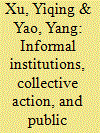| Srl | Item |
| 1 |
ID:
140178


|
|
|
|
|
| Summary/Abstract |
Do informal institutions, rules, and norms created and enforced by social groups promote good local governance in environments of weak democratic or bureaucratic institutions? This question is difficult to answer because of challenges in defining and measuring informal institutions and identifying their causal effects. In the article, we investigate the effect of lineage groups, one of the most important vehicles of informal institutions in rural China, on local public goods expenditure. Using a panel dataset of 220 Chinese villages from 1986 to 2005, we find that village leaders from the two largest family clans in a village increased local public investment considerably. This association is stronger when the clans appeared to be more cohesive. We also find that clans helped local leaders overcome the collective action problem of financing public goods, but there is little evidence suggesting that they held local leaders accountable.
|
|
|
|
|
|
|
|
|
|
|
|
|
|
|
|
| 2 |
ID:
172069


|
|
|
|
|
| Summary/Abstract |
In the reform era, the Chinese state often resorts to managed campaigns to implement important policies. This article examines how managed campaign influences the mode of bureaucratic operation in China. Avoiding a simplistic dichotomy between campaign mobilization and bureaucratic institutionalization, this study unpacks the Weberian bureaucratic concept and shows that some core dimensions of the model are compatible with managed campaign. While the pressure of mobilization tend to compromise functional differentiation and strict adherence to stable rules, they can reinforce other dimensions such as top-down control in a multilevel hierarchy and procedural integrity. The Chinese Communist Party (CCP) has configured the bureaucracy to serve its organizational and political needs, resulting in a mode of operation that partially conforms to the Western standard of public administration.
|
|
|
|
|
|
|
|
|
|
|
|
|
|
|
|
| 3 |
ID:
153547


|
|
|
|
|
| Summary/Abstract |
This article extends the role theory literature on domestic role contestation process by specifically examining bureaucracies as potential advocates of competing national role conceptions. While recent scholarship on domestic role contestation affirms the influence of party politics and cabinet dynamics on role enactment, bureaucracies remain underexplored as key actors despite the presence of a robust literature that supports their relevance in the foreign policymaking process. This article draws on expectations from both the role theory and bureaucratic politics literatures to explain how bureaucracies contest national roles and how such contestation may be resolved. The article tests these propositions through the study of China’s inter-bureaucratic contestation over its appropriate role in the South China Sea territorial disputes between 1979 and 1992. The article concurrently advances role studies on China by integrating them with more recent arguments about domestic role contestation. Traditionally, role theorists interested in China have either black-boxed the state or only focused on elite-mass role contestation, while this article explores intra-elite role contestation.
|
|
|
|
|
|
|
|
|
|
|
|
|
|
|
|
| 4 |
ID:
090848


|
|
|
|
|
| Publication |
2009.
|
| Summary/Abstract |
This article examines the political economy of subsoil law reform under the Putin administration. Despite repeated promises of imminent reform, the overhaul of the main legal basis governing some of the most important sectors of the Russian economy was subjected to repeated delays during the eight years of Putin's presidency. This article shows that the interaction of three major influences-the Kremlin's shifting policy priorities in its relations with subsoil management; the activities of the relevant state bureaucratic institutions; and the interests of the state-controlled mineral extracting companies-added to the complexity and delay.
|
|
|
|
|
|
|
|
|
|
|
|
|
|
|
|